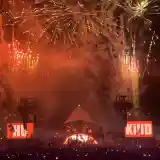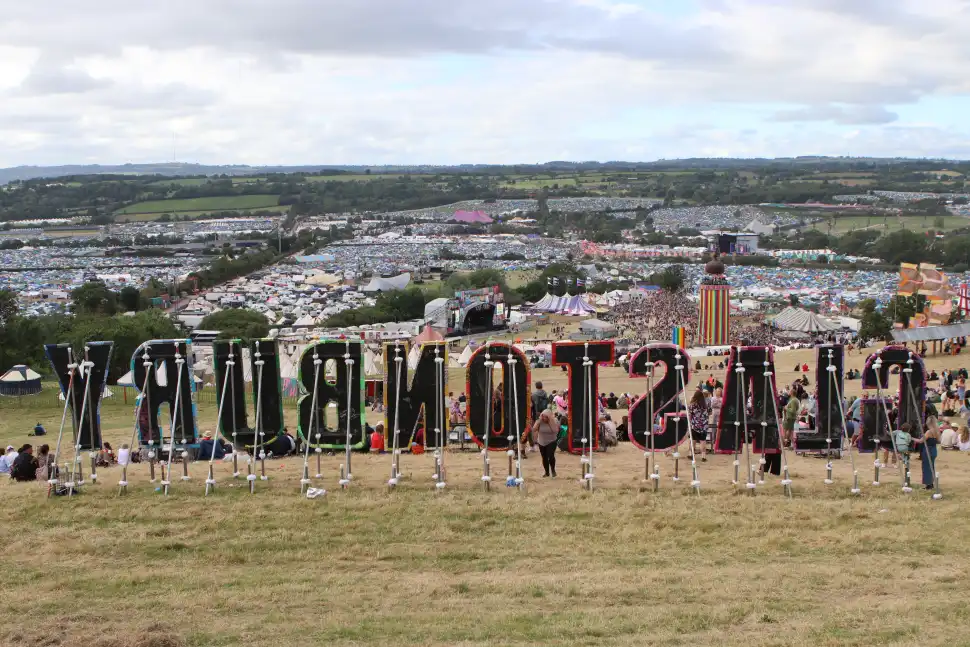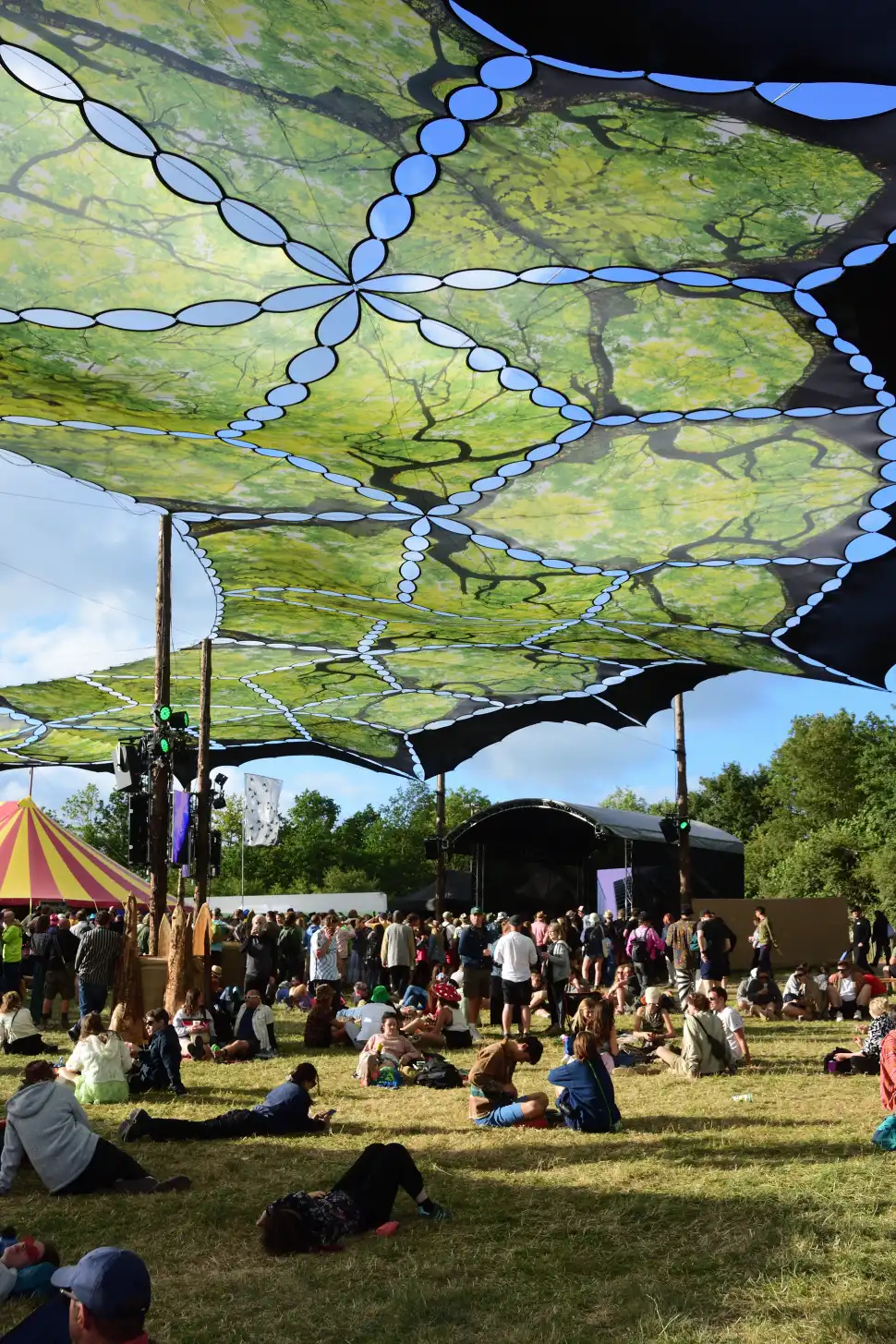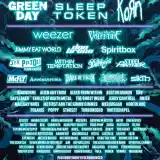Glastonbury Festival 2008
Friday 27th to Sunday 29th June 2008Worthy Farm, Pilton, Shepton Mallet, Somerset, BA4 4AZ, England MAP
£155
Daily capacity: 150,000
It's been reported that you feel that overall the attendees of Glastonbury Festival are too middle class and too old, and this has caused the Festival to lose its edge. As someone who's attended the last seventeen wonderful Glastonbury Festivals, I've noticed things change too.
I'd like to put forwards my own observations for you to perhaps consider, before you go too much down one particular path. You don't have to take any notice, and I'm sure others could put forwards other things that have passed me by, but I feel that to narrow down any problem simply to age or class would be a mistake. What follows is somewhat rambling - make of it what you will.
It's true that there are more people of a greater age attending now. Just as you've grown older, so have many people that have fallen in love over the years with what you've created, such as me; and while I don't feel I have any divine right to attend your Festival, I'd certainly miss it if I could no longer attend. It's normal nowadays to find a wide age range of people at any gig, so why should festivals be different? I'm aware you're often seen checking out the latest hot band - how would you feel to be told you were too old to be allowed in to watch them?
It's true that there are more people who might be considered 'middle class' attending now; but the same is true for society as a whole. Glastonbury Festival - at least to some extent - reflects the world it exists in. Where in my opinion it doesn't seem to reflect UK society is with its ethnic mix; my memories are of much greater diversity at my first festivals in the mid to late eighties than exists now (and all the larger festivals tend to be predominantly white).
Is simply a greater number of young people attending any answer? By itself, I don't think it is. If you make the festival appeal to a Reading/Leeds or NASS type of crowd, you could perhaps suffer the disorder and/or violence that has on occasions blighted those events - I'm sure Melvin could fill you in on the details from his own first hand experiences.
Each and every year, a number of oldies 'step aside' and a number of new people start to attend. The difference now is that whereas in the past the newbies were all youngsters, there's now people going for their first time aged 30, 40, 50, 60, even 70 - this is a symptom of the Festival's success. To fill it with youngsters would make it a virtual identikit of every other festival, when it's the fact that it's not like every other festival that makes it special.
The biggest change over the years? Glastonbury used to represent a radical alternative, nowadays it's mainstream. The world has embraced much of what Glastonbury represented, and moved across to where Glastonbury is ... and Glastonbury has mostly just stood still. While new radical alternatives are represented at the Festival they are mostly hidden away, while other things now long accepted by society have the same premium position they always have had.
Over the last twenty or so years that I've been attending, you've increased the entertainment likely to appeal to youngsters quite radically, with the introduction of the New Bands (now John Peel) Tent, the Dance Tent (which has morphed into the Dance Village), and now The Park (with world music huge superstars playing unannounced - why???).
During the same time, the space given to radical alternatives in the Green Fields hasn't grown at all (and could be said to have shrunk due to the exclusion of the travelling community, whether that exclusion is justified or not). While the addition of the Leftfield is welcomed, many unions long ago stopped offering any real alternative from the status quo.
I watched one of my favourite acts in the Cabaret Marquee this year, and enjoyed the act as much as ever. But I was struck that much was often dated political comment that went straight over much of the audience's head; some of this I guess is because we live in more politically settled times and people are generally less engaged with politics (and the Leftfield is a great way to try to engage people), but mostly it was because it wasn't relevant to people of a younger age. While I'd hate to see this act (one of many Glastonbury legends) not on the bill in future years, I wonder if a similar lack of relevance to the younger generations is repeated across the festival?
In the past the Festival had acts from across all genres of modern music. While it still books all those genres, some more modern styles - and the bigger current sellers - seem to have in the main passed the festival by. The bill is over-stacked with mostly-white-boys-with-guitars-doing-the-indie-thing bands, while (not my own favourites) r'n'b and hip-hop barely get a look-in in comparison.
There's also an amount outside of the Festival's control that's helped take the edge away. The much larger amount of regulation that the festival has to comply with has had an impact - after all, there won't be the same edge when everything is safe and near-perfectly organised (I used to love the gate crushes way back - they were fun. But they weren't safe!). Your security teams mugging attendees on numerous occasions this year when they felt they could get away with it is about as edgy as things get now.
To attend now, people have to be organised to register and then get tickets, and plan long in advance - not normally thought of as a young person's way (many can't decide what they're doing that night, let alone three or four months in advance
If you want more younger people involved, why not try to make them more an integral part of the organisation? (I'm aware that the festival excludes under-18s from working for it, for example). Why not, perhaps, link up with someone like the 'Underage' promoter (Sam Killcoyne), and have them involved somehow? (tho in many ways they're 'wannabe like them' scenes, a younger version of what's already on offer, so perhaps wouldn't change things too much). While I have nobody in mind (and I'm not meaning you!), perhaps it's time to 'retire' some of the older staff in favour of fresh ideas? - after all, music and entertainment is thought of as a young person's game.
And 'middle class'? That's the country as it is today, but you don't have to mirror it. Glastonbury used to be about everyone all in it together. This year there were 'special' areas all over the site, where paying a premium bought privilege - perhaps this is the area you should start off addressing?
I love Glastonbury, and I'd pay a fortune to re-live my first Glastonbury 1986 experience - but (I like to think) I'm not stuck in the past. In many ways, I think Glastonbury is.
Michael, you don't need to bring young people to Glastonbury; you need to bring Glastonbury to young people.
Neil Greenway
You can discuss this article on the festival forums - here
Latest Updates
 Glastonbury Festival 2025
Glastonbury Festival 2025festival details
last updated: Wed 18th Dec 2024
 Glastonbury Festival 2025
Glastonbury Festival 2025line-ups & rumours
last updated: Wed 18th Dec 2024
 Glastonbury Festival
Glastonbury Festivalfestival home page
last updated: Fri 11th Oct 2024
 Glastonbury Announces Ticket Sale Dates For 2025 Festival
Glastonbury Announces Ticket Sale Dates For 2025 FestivalTickets will go on sale mid-November, with small price increase
last updated: Fri 11th Oct 2024
 Glastonbury Festival 2024 small stages Review
Glastonbury Festival 2024 small stages ReviewGlastonbury - the Other Side of the Tracks
last updated: Wed 10th Jul 2024





